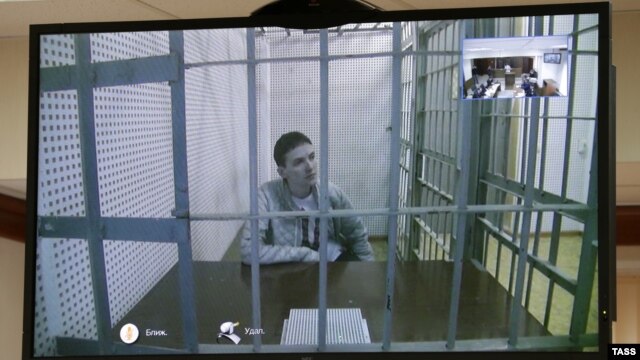Russia: Moscow court refuses to release Ukrainian pilot Savchenko
| Publisher | Radio Free Europe/Radio Liberty |
| Publication Date | 25 February 2015 |
| Cite as | Radio Free Europe/Radio Liberty, Russia: Moscow court refuses to release Ukrainian pilot Savchenko, 25 February 2015, available at: https://www.refworld.org/docid/5509411ec.html [accessed 1 June 2023] |
| Disclaimer | This is not a UNHCR publication. UNHCR is not responsible for, nor does it necessarily endorse, its content. Any views expressed are solely those of the author or publisher and do not necessarily reflect those of UNHCR, the United Nations or its Member States. |
February 25, 2015
By RFE/RL
 Ukrainian army pilot Nadezhda Savchenko is seen on a monitor during a video link at a hearing in a Moscow court on February 25.
Ukrainian army pilot Nadezhda Savchenko is seen on a monitor during a video link at a hearing in a Moscow court on February 25.
A Moscow appeals court has rejected hunger-striking Ukrainian pilot Nadia Savchenko's challenge against an extension of her pretrial detention period, upholding a ruling that she should remain in custody until May 13.
The Moscow City Court issued the decision on February 25.
Savchenko was captured by pro-Russian separatists in eastern Ukraine in June and taken to Russia in July.
Russia has charged her with involvement in a mortar attack that killed two Russian journalists in the conflict between government forces and Russian-backed rebels in eastern Ukraine.
In January, Savchenko was additionally charged with illegal border crossing.
Savchenko denies the charges, saying that she was kidnapped on Ukrainian territory and illegally transferred to Russia.
She began a hunger strike on December 13.
Lawyers, relatives, and human rights activists have expressed increasing concern over her health.
At the initial custody-extension hearing on February 10, a lawyer voiced concern that Savchenko may not survive until May 13 if she remains behind bars.
Veteran Crimean Tatar leader Mustafa Dzhemilev, who is Ukrainian lawmaker, called on Savchenko to end her hunger strike.
Addressing Savchenko in an interview with the Gordon news site on February 24, Dzhemilev predicted her hunger strike would not prompt Russian authorities to release her.
Dzhemilev, 71, is a former Soviet dissident who served six sentences in prison camps from 1966 to 1986.
He was force-fed during a 303-day hunger strike, the longest in the history of the Soviet human rights movement.
On February 24, German Foreign Ministry officials expressed concerns over Savchenko's health, saying that German doctors had visited Savchenko in detention on February 14.
On February 9, fourteen European Union foreign ministers launched a plea for Russia to free Savchenko.
On February 4, the U.S. State Department said Savchenko's life "hangs in the balance" and called her "a hostage to Russian authorities."
Savchenko, who is seen as a hero by many in Ukraine, was elected to the country's parliament in October, while in Russian detention.
She has been named to Ukraine's delegation to the Council of Europe's Parliamentary Assembly in Strasbourg.
Russia has denied requests by members of the parliament for her to be released in accordance with her parliamentary immunity.
Moscow has also brushed off demands by the United States and other Western governments for her release.
A February 12 agreement on a cease-fire and steps toward peace in Ukraine calls for the release of all prisoners, but Russia has made clear it does not believe that applies to Savchenko.
President Vladimir Putin's spokesman, Dmitry Peskov, said the day after the deal was sealed that no promises were made about Savchenko during his talks with the leaders of Ukraine, Germany, and France.
Peskov said that German Chancellor Angela Merkel, French President Francois Hollande, and Ukrainian President Petro Poroshenko had urged Savchenko's release, but that it was up to the courts to decide her fate.
Human rights activists and government critics say Russia's courts lack independence and that decisions in major cases are often dictated by the Kremlin.
With reporting by rapsinews.ru and Interfax
Link to original story on RFE/RL website
